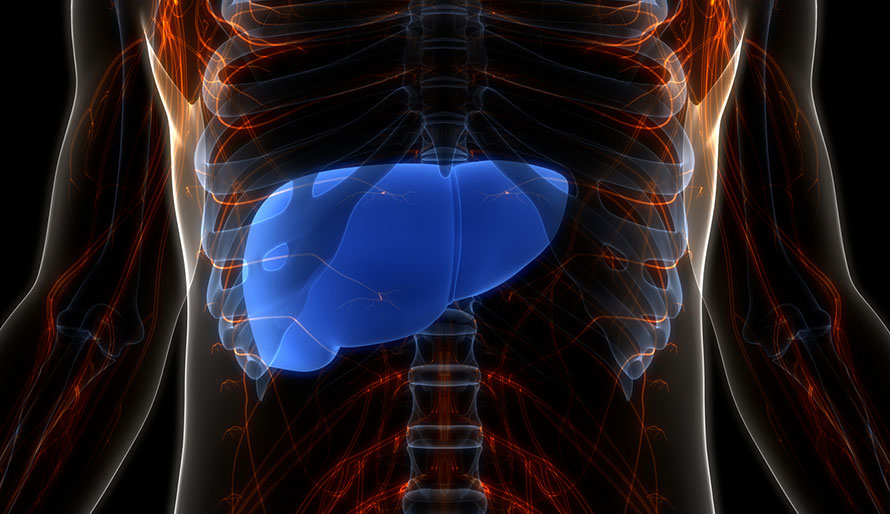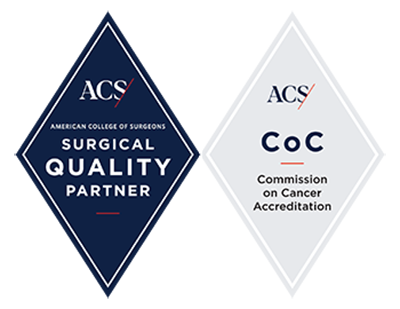Liver Cancer Surgery
Primary liver cancer originates in the liver, a vital organ in the upper right abdomen responsible for filtering the blood, breaking down toxins and producing bile to aid digestion. The most common type of primary liver cancer is hepatocellular carcinoma, which begins in the main liver cells (hepatocytes). Secondary liver cancer spreads to the liver after cancerous cells break away from a tumor that formed in another part of the body.
Risk factors for liver cancer include chronic hepatitis B or C infection, cirrhosis, heavy alcohol use and nonalcoholic fatty liver disease. Symptoms such as abdominal pain, weight loss, jaundice and liver enlargement may become apparent in advanced stages. Early diagnosis and treatment are essential to achieve the best possible outcome and quality of life. Options may include surgery, radiofrequency ablation, radiation therapy, chemotherapy, biological therapy and/or immunotherapy.
ACS Surgical Quality Partner for 30+ Years
Continuously Accredited by the American College of Surgeons Commission on Cancer since 1989 for our commitment to providing comprehensive, high-quality and multispecialty patient-centered care.
Why is liver cancer surgery performed?
Liver cancer surgery is performed to remove one or more tumors from the liver, aiming to eliminate the cancer. In general, surgery may be considered if the tumors are localized to the liver and the patient has sufficient liver function to tolerate the procedure. By removing the tumors, surgery can help prevent the cancer from spreading and potentially lead to a cure.
Who is a good candidate for liver cancer surgery?
Liver cancer surgery, such as partial hepatectomy—which involves removing the tumors and a slim margin of surrounding healthy tissue—is usually the preferred treatment for early-stage tumors that are confined to one area of the liver and have not spread to nearby blood vessels or metastasized to distant organs. If cancerous cells have spread, other treatments, such as radiofrequency ablation, chemotherapy or biological therapy, may be considered instead of (or in addition to) surgery.
Liver cancer surgery may not be appropriate for a patient who is in generally poor health or has an underlying liver condition, such as cirrhosis.

How to prepare for liver cancer surgery
To prepare for liver cancer surgery, the patient should undergo a comprehensive medical evaluation, which may include imaging tests and blood work to assess their liver function and overall health. A meeting with the surgical team to gain a thorough understanding of the procedure, anesthesia and postoperative care is essential to set realistic expectations. The patient should discuss all current medications—including prescription drugs, over-the-counter remedies, vitamins and supplements—because some medications may need to be adjusted or stopped before the procedure.
The patient should follow specific dietary guidelines, such as fasting the night before and the morning of surgery, to ensure an empty stomach and help prevent anesthesia complications, such as nausea, vomiting and aspiration. By engaging in light physical activity, if appropriate, the patient can improve their overall fitness and recovery. Additionally, the patient should arrange for postoperative support at home, ensuring they have someone available to assist with daily activities during the initial recovery period.
What happens during liver cancer surgery?
The types of liver cancer surgery include:
- Preoperative portal vein embolization – An interventional radiologist will redirect blood supply to a healthy portion of the liver to stimulate cell growth before liver cancer surgery.
- Minimally invasive liver cancer surgery – To remove small tumors localized to one area of the liver, the surgeon may perform laparoscopic or robotic-assisted surgery.
- Partial hepatectomy or lobectomy – To treat small liver tumors that do not involve major blood vessels, the surgeon may remove the tumors along with some surrounding healthy tissue, or possibly remove an entire lobe of the liver.
- Liver transplantation – It may be possible for the surgeon to replace the entire liver with a healthy donor liver if the tumor is small and localized and a donor with a compatible blood type is available.
- Associating liver partition and portal vein ligation (ALPPS) for staged hepatectomy – This innovative, two-stage procedure, which capitalizes on the regenerative ability of the liver, may be considered for treating advanced liver cancer or liver metastasis.
- Robotic-assisted liver cancer surgery – A specially trained surgeon will perform liver cancer surgery with the assistance of the da Vinci® Surgical System for heightened visualization and surgical precision.
What are the risks and possible complications of liver cancer surgery?
Like all types of surgery, liver cancer surgery carries several risks and potential complications, including excessive bleeding and infection, which usually can be managed with appropriate care. What’s more, several major blood vessels pass through or behind the liver, adding to the complexity of the organ itself, which tears easily and bleeds heavily when injured. However, the liver has a unique capacity to regenerate and can potentially compensate for the surgical removal of up to 80% of its mass by rebuilding itself over several weeks.
What to expect during recovery from liver cancer surgery
After liver cancer surgery, the patient can expect a hospital stay of about one to two weeks, where they will receive pain management and be closely monitored for surgical complications. Initially, the patient may have a drain in place to remove excess fluid from the surgical site.
The patient can expect to gradually resume eating, starting with liquids and progressing to solid foods as tolerated. Physical activity will be encouraged, beginning with gentle movements to help prevent blood clots and improve lung function. The patient should closely follow the surgeon’s postoperative instructions on incision care, medication use and activity restrictions. Full recovery can take up to several months, during which follow-up appointments will be essential to monitor liver function and check for signs of cancer recurrence.
How effective is liver cancer surgery?
Liver cancer surgery can be effective, especially for a patient with one or more early-stage tumors and good overall liver function. However, its effectiveness can vary depending on factors such as the location, size and number of liver tumors as well as the presence of cirrhosis or another underlying liver condition. In general, the overall prognosis is better when surgery is combined with other treatments and ongoing monitoring.
Benefit from world-class care at Moffitt Cancer Center
Moffitt has earned a stellar reputation as a leader in performing complex gastrointestinal procedures, including liver cancer surgery. Our board-certified, fellowship-trained surgeons perform a high number of procedures each year, leading to highly refined knowledge and expertise. Each patient receives a customized treatment plan developed by a multispecialty team. We also provide supportive care to minimize any side effects of treatment and enhance quality of life.
If you would like to learn more about liver cancer surgery, you can request an appointment with a specialist in our renowned Gastrointestinal Oncology Program by calling 1-888-663-3488 or submitting a new patient registration form online. We do not require referrals.
Helpful Links:

